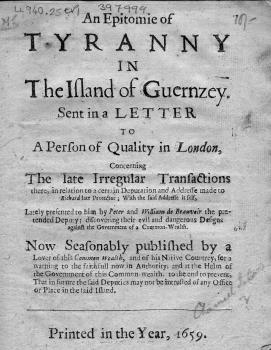8th May 2015
The trouble with Napier. From the Morning Post, June 19 1844.
21st April 2015
Donated 2015 by his granddaughter, Fiona Havergal. Working papers from the early 1920s, and a photograph of the Lieutenant-Colonel. Lt-Col. Kenneth Campbell moved to Sark in 1919, and was sworn in as Seneschal of Sark on the recommendation of W F Collings, the Seigneur. He had left Sark by 1923.
14th April 2015
The Library has a complete set of the Calendars of Patent Rolls, except for the years 1248-1280, (this volume can be accessed online.) Those below, of the last quarter of the 13th century, refer to the activities of the infamous Otto de Grandison, amongst other things.
An Island Meeting to discuss an application to found a Jesuit seminary in Guernsey. Admiral Sir James Saumarez was in the chair. He was to forward the petition against the school and the meeting's resolutions to Robert Peel, for Peel in turn to present to the King. The complete text, printed as a pamphlet by Nicolas Mauger, can be found in the Library's Petitions and Trials scrapbook, Vol. I.
The case of a Russian ship, the Graf Nikita, from The Political Magazine and Parliamentary, Naval, Military, and Literary Journal, Volume 6, 1783; in which an independent judgment of Guernsey's Royal Court was overturned for British political expediency.

Oliver Cromwell died on September 3, 1658. The States sought to send an address of condolence and loyalty to his son, 'his highness' Richard Cromwell, but were prevented from doing so by the Lieutenant-Governor, Captain Charles Waterhouse, who found their petition 'too submissive.' The leader of the republican party, Pierre De Beauvoir des Granges (1599-1678) and William De Beauvoir du Hoummet, potentially a less committed republican, wrote a defiant letter to Waterhouse, pointing out the Guernsey public's many grievances against him, and proceeded to sneak out of Guernsey and present their petition to Cromwell anyway, taking the opportunity to plead for the unpopular Des Granges to remain as Bailiff. Their actions prompted the publication of a pamphlet, An epitomie of tyranny in the island of Guernsey, which can be found in the Library. It was published anonymously at the beginning of 1659, and accuses the De Beauvoirs of all kinds of misdemeanors.
A translation of part of Laurent Carey's manuscript On the Customary Law of Guernsey, from the Guernsey and Jersey Magazine, Vol. V, 1838, edited by F. B. Tupper. Carey's Essai, written around the 1750s, formed the day-to-day reference for the proceedings of the Royal Court, under whose auspices it was eventually published in 1889. Here he was illustrating the fact that the inhabitants of Guernsey can choose to accept the proposed sovereign or not, who, once accepted, becomes 'un prince de leur propre choix'—and display absolute loyalty when they do so. The photograph below shows the proclamation of George V in Guernsey in 1910. The letter above is an invitation from the Governor to the constables to attend the proclamation of 1714. Library collection.
Reminiscences, from The Star, Tuesday December 9, 1890. The reaction of the population to the shocking event: a translation of an Ordinance of the Royal Court of 11 January, 1673; and an account from Roger North's Life of Dr John North, a 17th century Cambridge academic who was related to the Hattons. The illustration of the Castle before the explosion is a print published by Richard Godfrey in 1779, taken from a painting then in the possession of a [Mr] Carey.
An order of the Royal Court, May, 1661.
6th June 2017
A defence of Victor Hugo and of free speech from the Daily News (founded as a radical newspaper in 1846 by Charles Dickens. Its editor in 1855 was William Weir, a socialist barrister whose increasing deafness led him to journalism.) 'The political exiles in Jersey, who signed the protest against the expulsion of the three gentlemen connected with the journal L’Homme, have in their turn been ordered to quit the island before the 2nd November. What crime have they committed? They have said in 1855 what Sir Charles Wood, the Duke of Newcastle, and Sir James Graham said in 1851, when they were cabinet ministers.'